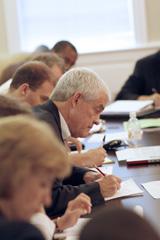
Josh Hamilton
The Fee Review Committee finalized its recommendation for next year’s fee increases Thursday, settling on an amount just two cents less than the UNC Board of Governors’ limit.
After a presentation from committee Co-Chair and Student Senate President Greg Doucette on this week’s student fee referendum and the Senate’s fee legislation — followed by a rebuttal from several groups requesting fees — the committee voted on a capped-fee package totaling $69.20, just under the BOG-mandated 6.5 percent cap. Fees for transit operations and the Health Center expansion bumped the grand total for the recommendation up to $92.20
In an e-mail sent Thursday, Vice Chancellor for Student Affairs Tom Stafford invited representatives of the groups requesting increases to Thursday’s meeting to give them a chance to respond to both the results of the Senate’s deliberations and the student vote, which he said “were generally not supportive of the fee requests.”
He asked in the e-mail that representatives explain to the fee committee “the results that would occur if the Committee uses the referendum and/or the Student Senate recommendation.”
Several groups took advantage of that opportunity, noting their concerns with relying too heavily on either.
“Students weren’t able to hear the presentations the committee has heard,” said Lisa Zapata, associate vice chancellor for student affairs, who represented the proposed increase for Recreational Sports. “The decision was not as informed as it could be.”
And Athletics Director Lee Fowler agreed.
“The kids didn’t know as much as they should know,” Fowler said.
He also pointed out that while a little more than 1,000 students voted in the referendum, about 10,000 students attend every game at Carter-Finley Stadium.
Athletics ranked last priority on the referendum however, trailing the next highest fee by more than 10 percent. Students also voted by an overwhelming margin — about 800 students out of the 1,000 — not to increase the Athletics fee by any amount.
Doucette asked Fowler why the referendum showed that about 74% of voters had such “hostility” toward Athletics.
“I only know 800 people who have hostility toward Athletics,” Fowler said. “There are a whole lot more than 1,000 people who care about Athletics.”
But not everyone was willing to discount the referendum.
Provost Larry Nielsen, who represented the proposal for the $23 Educational and Technology fee, pointed out that voters ranked this fee as their No. 2 priority.
“I would say you should pay attention to [the referendum] relative to the Ed Tech fee, but not relative to Athletics,” Nielsen said with a smile.
Representatives for the transit and student center operations fees noted they were pleased to see students rank them as No. 3 and No. 4 priorities, respectively.
Most of the groups also warned of dire consequences if they didn’t receive their full increases.
Zapata mentioned cutbacks in the gym’s service hours and even more caps on the number of intramural sports teams. She said the full increase was required to restore the cuts made to gym hours this year.
The fee increase for Athletics would bring in an additional $476,000 — 1 percent of the $40 million Athletics budget — an amount Fowler said was “desperately” needed to stay competitive in the ACC.
Transportation was in a similar situation, according to Director Tom Kendig, who said extra funding was needed to adjust for the growing demand in services.
“We have 600 students a week we have to bypass,” Kendig said of the students left behind because of full buses. “Had our increase been funded last year, these students would be happily on their buses.”
Although Stafford said he believed that every fee increase proposal was “needed, appropriate and fully justified,” he said the committee would have to cut the portion of the increase capped by the BOG down from $90.35 to $69.22.
He reminded the group however, to be aware of what they were voting for.
“If you vote to reduce a fee, what you’ve done, in essence, is to reduce the level of service,” Stafford said.
The committee cut down the capped portion of the fees to $69.20 and voted to fully fund both the transit operations fee and the Health Center expansion fee, which were exempt from the BOG cap.
Although committee member and freshman in mechanical engineering Nate Myers tried to redistribute the remaining 2 cents to recreational sports, the motion failed 4-5.